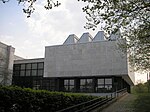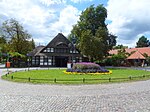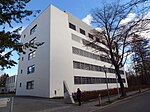Free University of Berlin
The Free University of Berlin (German: Freie Universität Berlin, often abbreviated as FU Berlin or simply FU) is a public research university in Berlin, Germany. It is one of eleven elite German research universities in the German Universities Excellence Initiative and is consistently ranked among Germany's top ten universities overall, with particular strengths in political science and humanities. It is recognised as a leading university in the international university tables. The Free University was founded in West Berlin in 1948 with American support during the early Cold War period as a de facto western continuation of the Frederick William University, which was in East Berlin and faced strong communist repression; its name refers to West Berlin's status as part of the Western Free World, in contrast to the communist-controlled university in East Berlin. In 2008, in a joint effort, The Free University of Berlin, along with the Hertie School of Governance, and WZB Social Science Research Center Berlin, created the Berlin Graduate School for Transnational Studies.
Excerpt from the Wikipedia article Free University of Berlin (License: CC BY-SA 3.0, Authors).Free University of Berlin
Habelschwerdter Allee, Berlin Dahlem
Geographical coordinates (GPS) Address Nearby Places Show on map
Geographical coordinates (GPS)
| Latitude | Longitude |
|---|---|
| N 52.453055555556 ° | E 13.290555555556 ° |
Address
Silberlaube
Habelschwerdter Allee 45
14195 Berlin, Dahlem
Germany
Open on Google Maps










